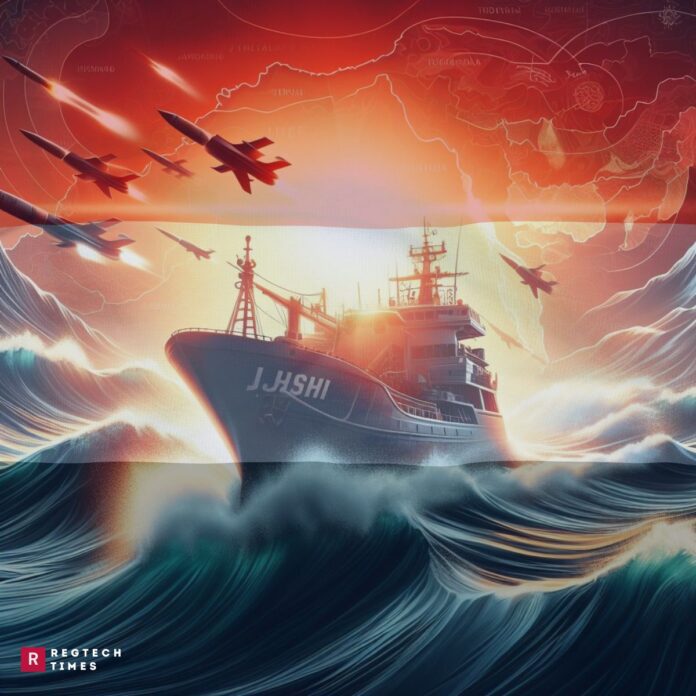The Red Sea, a crucial route for international seaborne trade, has seen a notable increase in maritime threats in recent months. The Houthi rebels, a Yemeni faction supported by Iran, have escalated their assaults on commercial shipping, waging more than 40 hostile raids against ships that pass through this vital canal. In addition to interfering with international trade, this increase in maritime antagonism highlights the larger geopolitical conflict in the Middle East that involves powerful nations like the United States, the United Kingdom, and Iran.
The Houthi Maritime Campaign
The Houthis first stated that their strikes were directed against ships connected to Israel or travelling there or back, which is consistent with their stated hostility toward Israel. However, the extent of their hostility has increased; they have recently attacked ships that are owned or run by US and UK organizations. This change came about as a result of US and UK retaliation attacks, underscoring a risky tit-for-tat that might further destabilize the area.
Nearly 15% of global seaborne traffic travels via the vital Red Sea corridor, which has been severely damaged. Large maritime firms have redirected boats across southern Africa in an attempt to escape the Houthi danger. Although this is a safer course of action, it comes with significant delays and increased operational expenses. This rerouting highlights the strategic power that control over such maritime chokepoints affords to non-state actors like the Houthis, in addition to having an impact on the dynamics of global trade.
Motives and Responses
The Houthi’s maritime aggressiveness is motivated by a variety of factors. Their acts are motivated by their position on the Gaza Strip conflict, but they also function as revenge against perceived Western power aggressions. A major uptick in activity was signalled by the November kidnapping of a commercial ship, which sparked a string of deliberate assaults that have subsequently caused severe harm and fatalities. These acts serve as a sobering reminder of the human cost of the conflict as well as its wider ramifications for global trade and security.
In retaliation, the US and the UK launched airstrikes against Houthi targets in Yemen, claiming the necessity to safeguard global commerce lines and preserve freedom of passage. These military operations, however, meant to prevent more aggression, have not yet stopped the Houthis’ maritime offensives and may even increase the likelihood of future escalation.
The Houthi Movement
A look into the Houthis’ evolutionary history is necessary to comprehend their behaviour. Since its formation in the 1990s, the Houthis have grown from a small organization supporting Yemen’s Zaidi Shia minority to a powerful force governing large areas, including the capital, Sanaa. Regional tensions, especially the Saudi-Iranian rivalry, have influenced their struggle, with the Yemeni conflict acting as a stand-in battlefield for these two dominant Middle Eastern nations.
International Dynamics and the Path Forward
The Houthi uprising and its regional ramifications have prompted a complicated international reaction. Iran has provided the Houthis with a great deal of assistance, including military hardware and instruction, which has improved their capacity to carry out such disruptive marine operations. The international world has criticized this backing, especially the US, which has thought that removing the Houthis’ terrorist label would be a smart strategy to reduce tensions and promote communication.
Yet making such a choice has a lot of ramifications. It draws attention to the fine line that must be drawn between dealing with pressing security issues and pursuing more extensive diplomatic measures to end the underlying conflict. A reevaluation of conventional approaches to international diplomacy and conflict resolution is important in light of the continuing circumstances in the Red Sea, which serve as a poignant reminder of the complex interactions between regional crises and global trade.
The Houthi strikes in the Red Sea are an indication of the evolving dynamics of modern conflict, where non-state actors may have a major influence on international relations and global trade in addition to being a regional security concern. The way the world reacts to these challenges and the choices the major countries make strategically will have long-term effects on international trade, regional stability, and the humanitarian situation in Yemen. There has never been a more crucial time for diplomatic engagement and strategic deterrence as the globe navigates these turbulent waters.


